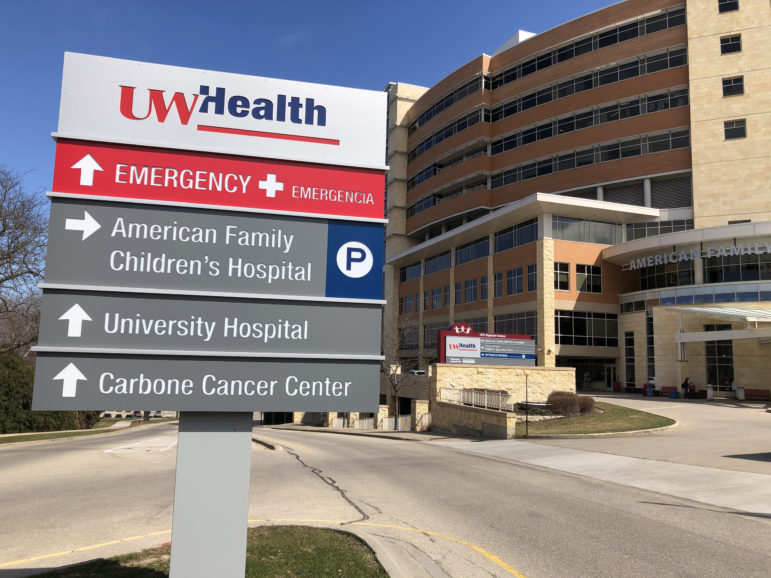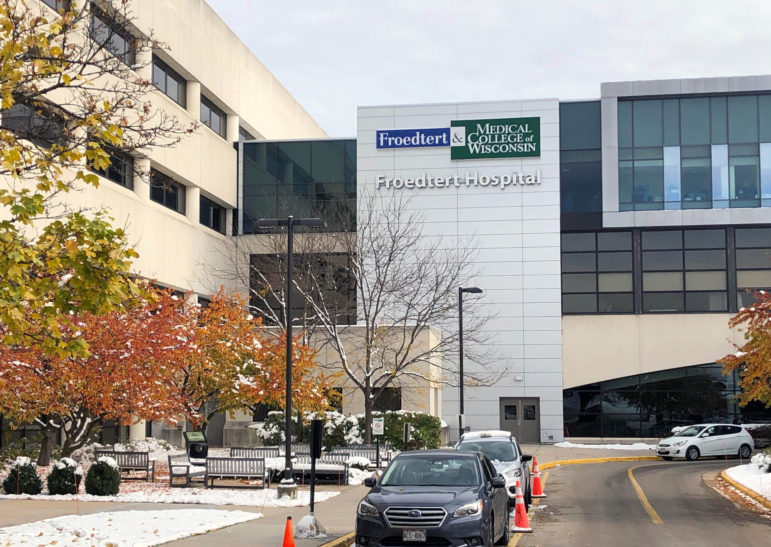Hospitals Sue Patients During Pandemic
Wisconsin hospitals continued to sue patients after Gov. Tony Evers declared a Public Health Emergency.

Froedtert Memorial Lutheran Hospital Inc., part of the Froedtert & the Medical College of Wisconsin, has sued at least 46 people in small claims cases since March 12. Here, Froedtert Hospital in Milwaukee is seen on Nov. 1, 2019. Gretchen Brown/WPR.
Blanche Jordan is taking social distancing seriously during the coronavirus pandemic. The 39-year-old is a breast cancer survivor with a compromised immune system.
So when she is not working as a caregiver at Elizabeth Residence, an assisted living facility outside of Milwaukee, she is staying inside the Milwaukee duplex she shares with her boyfriend and daughter, where she is stocked up on games to pass the time.
When her doorbell rang Sunday night, Jordan was beginning a new 1,000-piece Game of Thrones puzzle on her living room floor.

Blanche Jordan, a caregiver at an assisted living facility near Milwaukee, says a processes server showed up in-person to her duplex on Sunday, March 29 to serve her legal papers. Jordan, a breast cancer survivor, is being sued by Froedtert Memorial Lutheran Hospital Inc in Milwaukee over allegedly unpaid medical bills. She is one of at least 104 Wisconsinites being sued by hospitals in the state since Gov. Tony Evers declared a public health emergency on March 12. Photo courtesy of Blanche Jordan.
Jordan recalled standing up, putting on a mask, and opening the door to find a woman standing on the other side. The woman, who identified herself as Veronica, handed Jordan a paper and relayed a message: “You’ve been served.”
The woman worked for a firm called Badger Process Inc. The paper was a court summons. It said Froedtert Memorial Lutheran Hospital Inc., part of the Froedtert & the Medical College of Wisconsin health network, was suing Jordan for $7,150. Jordan said it was just three weeks after she paid off a different $5,000-plus Froedtert debt linked to a hysterectomy that her insurance did not cover.
The lawsuit was the last thing she expected during a viral pandemic.
“This lady came to my door. She didn’t have a mask on. She didn’t have gloves. And she looked at me like I’m crazy, because I had a mask across my face,” Jordan recalled, adding, “I’m high-risk.”
Life in Wisconsin has been transformed since March 12, when Gov. Tony Evers declared a Public Health Emergency to combat COVID-19, the disease caused by the coronavirus.
Businesses have shuttered across the state and laid off workers, while public officials urge residents to stay at home to slow the virus’ spread. On Friday, Wisconsin Gov. Evers ordered a 60-day ban on evictions and home foreclosures.
Yet firms representing health systems continued to sue patients over medical debt.
Jordan is one of at least 46 people sued by Froedtert in small claims cases since March 12. Those cases are among at least 104 similar suits filed statewide by health systems over the same period, according to an analysis of small claims cases by Wisconsin Public Radio and Wisconsin Watch.
Steve Schooff, a spokesman, said Froedtert “suspended filing small claims suits” as of March 18 in response to COVID-19.
“In addition, we continue to work with patients related to financial counseling and are allowing patients with financial hardship who are on a payment plan to defer payments while financial assistance is discussed with them,” he said.
Yet court records show at least 18 lawsuits filed on the hospital’s behalf since then, including 15 filed on March 31 alone. (The suit against Jordan was filed on March 17.) Schooff did not explain the discrepancy.
Keary Bilka, an attorney representing Froedtert in the most recent suits, declined comment.
‘Really? In the middle of all this?’
Court records show that at least six additional health systems have also sued patients during the pandemic.
UW Health in Madison has filed 19 lawsuits since March 12. Marshfield Clinic, which covers northern, central and western Wisconsin, has filed at least 14 since that date, followed by Bellin Health, based in Green Bay (11); La Crosse-based Gundersen Health System (10); and Aspirus Grand View Health System, which serves parts of northern Wisconsin (3). Froedtert South, which serves southeastern Wisconsin, also filed one suit.

UW Health has filed 19 lawsuits against patients since March 12. Here, American Family Children’s Hospital, part of the UW Health system, is seen in Madison, Wis., on April 1. Photo by Dee J. Hall / Wisconsin Watch.
Five of those health systems — UW Health, Gundersen, Marshfield, Aspirus and Froedtert South — said they have since paused certain legal actions, which court records support.
Tom Russell, a UW Health spokesman, said the health system instructed its legal agencies on March 26 “to cease pursuit of any legal activity.”
“These should be stopped for now,” he said.
Andy Napgezek, an Aspirus spokesman, said the system has “paused all legal activity.”
Gundersen has “paused small claims,” and Marshfield “paused claims” on March 19, spokespeople for those systems said.
Tom Duncan, a Froedtert South spokesman, said his system has generally “suspended filing small claim suits” during the pandemic. “However, in rare circumstances, certain small claim suits may be filed to preserve Froedtert South rights. For example: If a medical debt has been in existence for 6 years, and the statute of limitations is about to end.”
Bellin did not immediately respond to questions from Wisconsin Public Radio and Wisconsin Watch.
“I couldn’t believe someone would do that,” she said about receiving legal papers during a pandemic. “They’re our bills, but really? In the middle of all of this?”
The woman said her husband offered the process server sympathy, apologizing that the man had to serve papers during a public health emergency.
The woman, who works for a Madison-based nonprofit, saw things differently. “That’s a choice too. I wouldn’t be able to sleep at night.”
She said the couple’s debt stems from a series of health complications — “You can put it in the category of heart disease” — that sent her husband in and out of a UW Health emergency room.
Quartz Health Solutions provides the couple insurance through the husband’s job. He is an “essential worker” in state government, the woman said. They live with two children, including a daughter with unspecified health complications.
Another man was not aware that Marshfield Clinic had sued him until a reporter told him. “Yeah, that’s me but I don’t know anything about a lawsuit,” the man said, confirming that his name and address matched those of the defendant in a mid-March suit.
“I guess I have some phone calls to make.”
Medical debts and state response
More than a quarter of U.S. adults say they or someone they know has faced trouble paying a medical bill, according to a 2016 survey by the Kaiser Family Foundation and the New York Times. Consumer advocates have increasingly scrutinized hospital debt collection. Some hospitals have stopped the practice of suing patients in recent months following investigative reporting by MLK50 and ProPublica.
Jessica Roulette, an attorney with Legal Action of Wisconsin, which provides free legal services to low-income people, said most people facing medical debt and hospital lawsuits are “underinsured,” meaning insurance leaves them on the hook to pay thousands of dollars in out-of-pocket health expenses. Medical bills often fall below things like rent, utilities and food in the “hierarchy of bills and obligations,” Roulette said.
Bobby Peterson, executive director of ABC for Health, a nonprofit public-interest law firm in Madison, called it stressful under normal circumstances to face a medical debt lawsuit.
“Today it’s a whole new ballgame,” he said, referring to workers who have lost their jobs and possibly health insurance during the pandemic. Just last week, Wisconsinites filed more than 115,000 unemployment claims.
Peterson saw a possible disconnect between some hospitals deciding to suspend small claims suits and the law firms they retain to execute debt cases. The agencies serving legal papers may also be out of the loop.
“Are the hospitals communicating their own policies internally, and are they communicating with their hired guns out there, making sure that they back off?” Peterson asked.
Evers’ office did not immediately respond to a query.
The pandemic presents “particular problems for collection of medical debts through the court system,” Roulette said.
Some legal practices, including in-person process serving, are at odds with public health during the pandemic, Roulette said. But creditors still face statute of limitations deadlines, meaning they could miss their window to sue by waiting too long.
Roulette said people still earning an income should pay their medical bills on time, and people with insurance should make sure their providers properly process their claims. But she said health care providers should consider holding off on lawsuits, if they can afford it.
“We are truly in uncharted waters,” Roulette said. “I would hope that everyone is simply doing the best they can.”
Paycheck to paycheck
The state of Wisconsin considers Jordan, the Milwaukee caregiver being sued, an “essential” worker during the pandemic, meaning her job is not subject to the “Safer At Home” order. She works five days each week from 7 a.m. to 3 p.m., alternating work on the weekends. The pay — $15.75 per hour — barely covers her expenses.
Rent, health insurance, utilities and the nearly $300 in garnishments by Froedtert that recently ended, left Jordan with little of her $1,300 biweekly paycheck to spend on other necessities. She filed for bankruptcy in 2016 when, despite being insured, she said she could no longer afford to pay off her debts from treating her aggressive breast cancer.

Blanche Jordan is one of at least 46 people sued by Froedtert in small claims cases since March 12. Here, Froedtert Hospital in Milwaukee is seen on Nov. 1, 2019. Photo by Corrinne Hess / WPR.
That journey briefly left her homeless following an eviction, but she generally manages to pay her current, more understanding landlord on time, Jordan said.
“I’m blessed to have a landlord that’s understanding because his wife died of breast cancer,” she said.
Jordan said her most recent medical debt stemmed from a hysterectomy that was separate from but related to her cancer treatment. She chose Froedtert to perform the procedure, considering it “the best hospital that we have in Wisconsin.”
What she did not realize, she said: Froedtert did not accept her insurance, which she purchased on a federal exchange created by the Affordable Care Act. Hospital administrators accepted and ran her insurance card, Jordan said, but never mentioned that her insurer would not cover the procedure.
In 2019, a judge in the Milwaukee County Small Claims Commissioner Court awarded Froedtert a judgment against Jordan for about $5,300, including court fees, which the hospital claimed by garnishment of her wages. She finished paying that debt during the first week of March — only to be served papers for the alleged $7,150 debt three weeks later.
Jordan assumes this covers the remainder of the bill for her hysterectomy, which she remembers totaling around $12,000. Wisconsin caps small claims at $10,000.
She will eventually see her day in court, although it’s not clear when. The coronavirus postponed her court date to May 28, assuming court proceedings resume by then.
Until then, Jordan will continue to perform “essential” duties at the assisted living facility, but she will otherwise stay isolated at home, she said, likely playing Scrabble or Uno with her family.
The suit adds an extra layer of frustration as she tries to wait out the pandemic.
“Which is it?” she asked. “Do you want to sue me or do you want to wait?”
This story comes from a partnership of Wisconsin Watch and Wisconsin Public Radio. Bram Sable-Smith is WPR’s Mike Simonson Memorial Investigative Fellow embedded in the newsroom of Wisconsin Watch (wisconsinwatch.org), which collaborates with WPR, PBS Wisconsin, other news media and the University of Wisconsin-Madison School of Journalism and Mass Communication. All works created, published, posted or disseminated by Wisconsin Watch do not necessarily reflect the views or opinions of UW-Madison or any of its affiliates.
More about the Coronavirus Pandemic
- Governors Tony Evers, JB Pritzker, Tim Walz, and Gretchen Whitmer Issue a Joint Statement Concerning Reports that Donald Trump Gave Russian Dictator Putin American COVID-19 Supplies - Gov. Tony Evers - Oct 11th, 2024
- MHD Release: Milwaukee Health Department Launches COVID-19 Wastewater Testing Dashboard - City of Milwaukee Health Department - Jan 23rd, 2024
- Milwaukee County Announces New Policies Related to COVID-19 Pandemic - County Executive David Crowley - May 9th, 2023
- DHS Details End of Emergency COVID-19 Response - Wisconsin Department of Health Services - Apr 26th, 2023
- Milwaukee Health Department Announces Upcoming Changes to COVID-19 Services - City of Milwaukee Health Department - Mar 17th, 2023
- Fitzgerald Applauds Passage of COVID-19 Origin Act - U.S. Rep. Scott Fitzgerald - Mar 10th, 2023
- DHS Expands Free COVID-19 Testing Program - Wisconsin Department of Health Services - Feb 10th, 2023
- MKE County: COVID-19 Hospitalizations Rising - Graham Kilmer - Jan 16th, 2023
- Not Enough Getting Bivalent Booster Shots, State Health Officials Warn - Gaby Vinick - Dec 26th, 2022
- Nearly All Wisconsinites Age 6 Months and Older Now Eligible for Updated COVID-19 Vaccine - Wisconsin Department of Health Services - Dec 15th, 2022
Read more about Coronavirus Pandemic here
-
Wisconsin Lacks Clear System for Tracking Police Caught Lying
 May 9th, 2024 by Jacob Resneck
May 9th, 2024 by Jacob Resneck
-
Voters With Disabilities Demand Electronic Voting Option
 Apr 18th, 2024 by Alexander Shur
Apr 18th, 2024 by Alexander Shur
-
Few SNAP Recipients Reimbursed for Spoiled Food
 Apr 9th, 2024 by Addie Costello
Apr 9th, 2024 by Addie Costello























Don’t blame the hospitals– you would not expect Kroger PickNSave to provide you with a loaf of bread without your paying for it. Hospitals need payment for their services also.
What is needed is– MEDICARE-for-ALL, from your first breath to your last gasp.
Pay for it the same way we pay for Socialist highways and weapons for war: everyone contributes to the cause by paying taxes. Extend the Social Security and Medicare funding by taxing ALL income, not just wages. If you are fortunate to make a living by investments only (no wages), then pay your fair share. Wage earners pay the full amount now.
Need more income to pay for Medicare-for-all– tax the churches. These businesses evade taxes now– that’s how some preachers have luxury homes, Mercedes, even their own jets to travel.
There’s a legal loophole the hospitals are using to make them look good to the public. They repeatedly are saying they have suspended pursuit of small claims in court. If I’m not mistaken, a small claim is by definition under $5,000. Anything over that is a large claim. A trip to the ER will run north of $5K these days. Looks like business as usual.